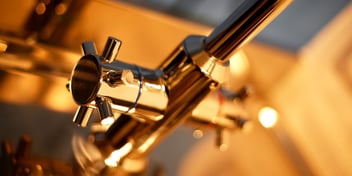This new alloy could improve drinking water quality
Scientists from the University of New South Wales (UNSW) have developed a new alloy that could replace lead in traditional brass plumbing materials.
The UNSW’s Dr Kevin Laws said the alloy, named ‘bright brass’, would retain the advantages lead provides in the manufacturing process but without any potential toxicity.
“The lead forms tiny globules, like oil in water, which can be seen under the microscope,” Laws said.
“These globules provide lubrication, just like lead in leaded petrol, which helps with ‘free machining’ and associated manufacturing processes, as well as helping the brass to seal once in service.”
Although Australian water utilities provide safe drinking water, a recent alert advising people to flush their cold water taps brought the issue of lead in potable water to the fore.
The alert, issued in July by the Environmental Health Standing Committee (enHealth), noted lead is rarely used in water pipes in Australia but is still used in a range of plumbing products, such as brass fittings.
“These products are widely used in drinking water systems in homes, buildings and associated water supply points, such as drinking water fountains,” enHealth said.
“Lead can dissolve into drinking water from some brass plumbing fittings, particularly where water has been sitting in contact with these brass plumbing products for long periods.”
The nation’s chief medical officer Brendan Murphy has assured Australians that household drinking water is safe and said it is “extremely unlikely” that lead in drinking water, even consumed over a lifetime, would result in lead poisoning.
He said the concentration of lead set in the Australian Drinking Water Guidelines – no more than 0.01 mg/L – is “very conservative” in order to protect the most vulnerable, such as very young children and pregnant women.
“There is no evidence of adverse effects on human health from the consumption of lead in drinking water in Australia,” Murphy said.
“However, lead is not considered to be beneficial or necessary for humans; therefore public health experts recommend Australians take every opportunity to limit potential exposure from all sources.”
New alloy, no problems
In January this year, the Australian Building Codes Board commissioned a report into lead in plumbing products by Professor Mark Taylor from Macquarie University.
Taylor recommended using low lead or lead-free plumbing components during the installation of drinking water systems in order to limit the release of lead into drinking water.
In line with this, the UNSW researchers formed a company, Advanced Alloy Holdings, to commercialise their findings. They received a $15,000 grant through the NSW Government’s Boosting Business Innovation Program to conduct research, which helped achieve proof-of-concept.
“We have successfully cast bright brass that includes safe, lubricating particles that form as the alloy cools down after casting,” Laws said.
“Our new alloys … are cost-competitive and perform similarly mechanically, if not better, than leaded brass.”
The final stage of the project is to complete machining and manufacturing trials to assess how the alloys perform.
Laws said the bright brass products would be available in about a year, once the research and development process was complete.

